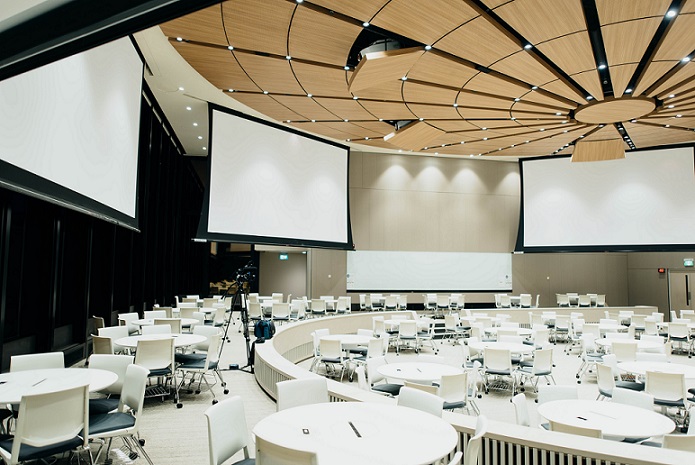3 Secrets To Creating An Amazing Culture in an Events Company
The events industry presents some interesting culture obstacles. Such an intense focus on the technical aspects leads to some areas getting neglected. Here’s what you can learn from an organisation that overcame those problems.
There are some unique challenges to confront when culture building in an events company.
You’re working in an extremely technical industry. Clients require you to work quickly and overcome lots of challenges. It’s essential to the event running well.
The problem is that many fail to look at the culture behind their service. They rely on their technical wizardry to keep the business running. But this leads to the development of culture problems that can have devastating long-term impacts.
This is especially the case for small businesses. They’re often so focused on delivering their service that building a culture is a secondary concern.
Such was the case with one of our clients.
Culture Building in an Events company Case Study
Our client is a full-service event management business that offers a wide array of services. In addition to event design and operation, they help clients with the technical aspects of their events. The business also offers audio-visual equipment hire. Plus, they help clients develop engaging content for their events.
It’s also a small, family-run business. They’ve built themselves from the ground up and now operate teams in three cities across Australia.
The organisation prides itself on its technical abilities. They’re able to deliver amazing events for their clients.
However, this technical focus led to them neglecting the cultural aspect of their business. This led to the development of a toxic culture in the workplace.
The business came to Great Managers to learn how to overcome their company culture problems.
The Issues
Our client came to us with many of the signs of a dysfunctional company. In particular, they’d allowed their staff to start dictating how the business operated.
This is a common problem in the events industry. Technical expertise can lead to some of your people thinking that they’re indispensable. After all, where are you going to find someone else with their skillsets?
This can lead to a certain level of arrogance developing. Your people start acting how they feel like acting. This can lead to the development of destructive behaviours that don’t reflect well on your brand.
Our client had experienced this problem first-hand. They had one particularly destructive employee who felt like he didn’t need to operate by any guidelines they created. The leadership allowed him to get away with his behaviour because they needed him. However, they soon realised that this created a toxic culture in the workplace.
If one person can act poorly, what’s to stop everyone else from emulating them?
The organisation’s general manager struggled to communicate effectively with this person. That’s also understandable in the events industry. Most who ascend to leadership positions do so off the back of their technical expertise. That means they understand the job but haven’t developed the skills needed to manage others.
This can lead to an organisation relying on its technical expertise to make up for its company culture problems.
That’s what our client found themselves doing and they recognised it was time for a change. They knew that culture building in an events company means looking beyond the technical.
The Great Managers Solution
We identified that a lack of structure and effective communication had led to our client’s problems.
They did not have clear values for their people. That’s what led to some of their people trying to dictate how they worked and represented the brand.
We helped them to establish these values. However, we also worked with them on communication.
The organisation’s leadership knew it needed to have some tough conversations. In particular, they needed to talk to the previously mentioned person about his behaviour.
It’s a conversation that the organisation’s leadership had put off for a number of months. They were worried about the potential effects that the confrontation could have on their business.
Great Managers introduced them to a conversational model that would help them. Using this model, they could discuss their people’s performance while minimising conflict.
The End Result
Our client finally moved away from the mindset that technical skills can make up for a destructive culture.
Its leadership set clear values for its staff. This ensured that the organisation’s people no longer controlled its culture.
Plus, we equipped them with the skills needed to handle the tough conversations. The organisation’s general manager put these new skills to good use then confronting the toxic employee.
After two conversations, the employee apologised for his behaviour. And not only that, thanked his General Manager for being straight with him. Best of all, they’ve changed his behaviour to fit with the organisation’s values.
Culture Building in an Events company – What You Can Learn
This story is one that’s typical of many organisations in the events sector. It’s particularly relatable for small businesses that have experienced growth in recent years.
Here’s what you can learn about culture building in the events industry from our client’s story.

Secret #1 – Technical Expertise Isn’t Enough
As mentioned, many events organisations believe their technical expertise makes them indispensable. How people see their brand comes second to the service that they can deliver.
Of course, it’s important that you maintain high standards in your service. But you also have to think about how you present yourself to your clients.
In our client’s case, they had some toxic influences that manifested whenever they worked. These are things that a lot of clients take notice of. Toxicity is one of the signs of a dysfunctional company. If it’s allowed to continue, clients may pick up on the sign and decide to work with someone else.
Your organisation’s technical expertise isn’t enough to make up for the damage that company culture problems do to your brand.
This mindset also extends to your people. As was the case with our client, you may have very talented people who think they’re indispensable. They may think their behaviour doesn’t matter as long as they do the job.
That’s a problem for your organisation. Even if your clients don’t see that behaviour, it still affects your organisation. Your people may see that you’re not doing anything about the toxic influence. This can lead to resentment building up. At worse, you may find your people start to emulate the toxic influence.
Remember that you’re operating a business that has a brand. Put standards in place and make sure your people know that their technical skills aren’t enough. They also have to meet your expectations of them in terms of their behaviour.
Secret #2 – Don’t Let Your People Control Your Culture
This is a problem that often arises when you have technical people in leadership roles.
You may understand the work that your people do better than the work that you need to do. However, you’re a manager now, which means you have to provide guidance and set standards.
Our client’s management struggled to do this. They allowed their people to dictate the company culture for them. That’s what led to the rise of a toxic culture in the workplace. Their people wanted to focus solely on the technical aspects of their work rather than how they represented the brand.
That meant they took control of the organisation’s culture from the owners.
The organisation’s people disengaged from its core values. They delivered the service without caring about the effects that their behaviours had on the brand.
Your people can play a role in helping you to define your organisational culture. But they’re not the ones leading the business. They need you to help them understand your core values and vision for the organisation.
Your training plays a huge role in establishing your culture. Make your people aware of what you expect from them (and why) from the beginning.

Secret #3 – Have the Difficult Conversations
The difficult conversations aren’t something that many in the events sector have experience with. As was the case with our client, event sector managers often try to ignore the problem and hope that it goes away.
As you can see from this case study, that leads to company culture problems.
Developing the courage to have the difficult conversations is a key aspect of culture building in the events industry.
But it’s not enough to just know that you need to have the conversations. You also need a framework to help you to manage the conversation so you achieve the best outcome.
Great Managers has a six-step model that helps you to have these key conversations:
Step 1 – Explain the Situation
Establish the reasons behind the conversation in a way that engages the other person. Then, talk about the facts of the situation. Be concise and explain the gap between your expectations and what’s happening.
Step 2 – Listen to Understand
Invite discussion after explaining the situation. The key here is that you listen intently so you understand the other person’s viewpoint. Paraphrase back and reflect the person’s emotions. Ask open questions and clarify the points that you discuss.
Step 3 – Explore Your Options
This is where you start to develop a solution to the problem. Use plural nouns and open questions to encourage the sharing of ideas. Use phrases like “what suggestions do you have” or “what ideas do you have”.
Don’t say “what’s your suggestion.” This limits the conversation.
Plural nouns show that you’re open to suggestion and want to work through the problem together. Discuss each idea and start moving towards the next step.
Step 4 – Move Towards a Solution
This is where you narrow the ideas shared down into a workable solution.
The key here is that you don’t ask lots of “why” questions. Those come off as confrontational and slow your progress.
Instead, use a lot of questions that start with “what” and “how”. For example, “how do you think we can implement this idea?”
Get a sense of what you can realistically accomplish going forward. But it’s important that you’re taking ownership of the solution. You’re using these questions to work towards the outcome that you want while taking the other person’s ideas into account.
Step 5 – Find Agreement
As you narrow the shared ideas down, you come closer to finding agreement.
Be specific here. Offer a clear explanation of your expectations going forward. Discuss what needs to get done, who needs to do it, and when.
You may have to repeat this step a couple of times before you agree on the next steps. Conclude with a restatement of your commitments to your employee and what you expect from them.
Step 6 – Express Confidence
End the conversation with an expression of your confidence that you’ll be able to overcome the issues discussed.
The key here is that you’re sincere in wanting to move forward.
Following these steps allows you to have an inclusive conversation that confronts the issues. This increases the likelihood of a desirable outcome.
The Final Word
Culture building in the events industry isn’t a simple task. It requires a mindset shift. You have to move away from the technical aspects and start thinking about employee behaviours.
Our client achieved amazing results when they did this. They eliminated the toxic influences that led to company culture problems. Their management team now has the skills needed to confront minor issues before they become major culture problems.
Does the culture of your events business feel like it’s out of your control?
Are you struggling to have the conversation needed to move your business forward?
Do you want to know more about Culture Building in an Events company?
Great Managers can help you. Register for our upcoming webinar to learn more about the management techniques that you need to learn.








